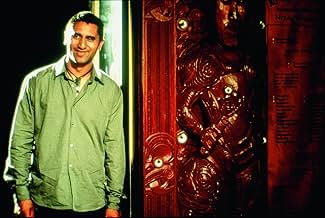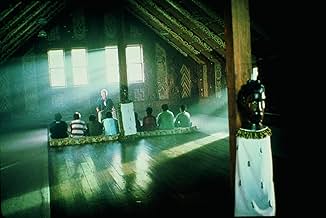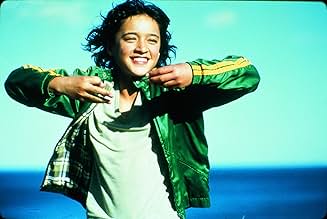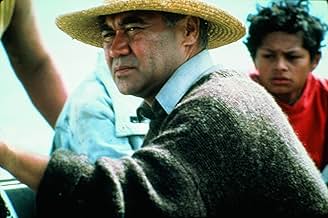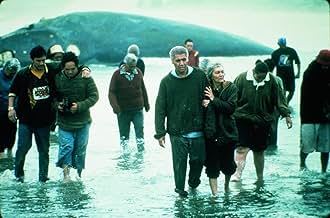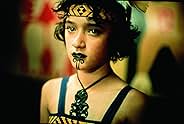एक युवा माओरी लड़की के रूप में प्यार, अस्वीकृति और जीत की एक समकालीन कहानी एक भाग्य को पूरा करने के लिए लड़ती है जिसे उसके दादा पहचानने से इनकार करते हैं।एक युवा माओरी लड़की के रूप में प्यार, अस्वीकृति और जीत की एक समकालीन कहानी एक भाग्य को पूरा करने के लिए लड़ती है जिसे उसके दादा पहचानने से इनकार करते हैं।एक युवा माओरी लड़की के रूप में प्यार, अस्वीकृति और जीत की एक समकालीन कहानी एक भाग्य को पूरा करने के लिए लड़ती है जिसे उसके दादा पहचानने से इनकार करते हैं।
- 1 ऑस्कर के लिए नामांकित
- 33 जीत और कुल 35 नामांकन
- Maka
- (as Mabel Wharekawa-Burt)
- Hemi's Dad
- (as Roimata Taimana)
- Jake
- (as Tyrone White)
फ़ीचर्ड समीक्षाएं
The DVD of 'Whale Rider' was released in 2004 but it never attracted me greatly. and getting round to watching it has taken me some time. There are so many films of a similar type where the story sounds very admirable and wholesome, but experience warns that the combination of a cast of enthusiastic and largely non-professional actors, a limited budget, and over-enthusiastic direction by somebody not fully understanding the limitations of the medium, often culminates in a rather mawkish product. The fear that this might have happened here has kept me away for a long time. To anyone else in this position let me recommend getting a disk and giving it a spin as soon as possible.
Admittedly promoters of such films take a considerable risk - often their final budget stands or falls largely on the performance of the star. The rest of the cast are essentially ordinary people playing themselves and even though they may not have much acting experience, their parts are not too demanding so minor imperfections are often not too disruptive. But one minor glitch in the performance of the star can break the spell which is created when the audience begins to feel involved in the story and concerned about what happens to the individuals portrayed. This is essentially a film by a woman director about feminine empowerment, but not the sterile antagonistic type which looks for a world run exclusively by women (preferably with only a few men left around to keep the sperm banks well stocked). Here we are looking at the true equality that first began to be recognised during the World Wars of the twentieth century when everyone understood there was an enormous task to accomplish and we could never finish it unless we harnessed the full abilities of everyone in our society. This is a film from New Zealand where the leaders of a traditionally male dominated Maori culture, badly disrupted by the impact of the more sophisticated civilization of western settlers, are attempting to go back to their roots to avoid being totally absorbed into the new colonial culture but remain unable to fully recognise that women must play a vital part in any process of cultural regeneration. This film, based on a book by the first Maori author to have a work published in North America, is a fictional fable that shows one way in which such an essential change to the fundamental structure of their traditional culture might take place.
This may not sound like the basis for an enjoyable film for a Western family audience, but the host of best film awards it has received does convey some sense of the extent to which it is a very exceptional movie. Although almost everyone involved played their full part in its success; it was ultimately the outstanding Oscar nominated performance given by its star which made the film memorable. Keisha Castle-Hughes was 12 years old when this was filmed and it won her the youngest ever Best Actress nomination. If there were only more young actors of this calibre, we might have more films fostering positive values in society, rather than often competing to outdo each other in violence, horror or degradation. Incidentally, but more importantly, we might also begin to find that the former films are capable of providing us all, including the younger generation, with a generally more enjoyable viewing experience.
The story is a battle of wills between the tradition bound village elder Koro (solidly played by Rawiri Paratene) and his own grand-daughter Pai. Koro is seeking a new chief among the first-born sons of his village to inspire their tribe in its present day struggles in 21st century New Zealand. Pai senses in her heart that she is that new chief (despite her gender) and will not give up her quest to prove herself worthy of the task, even if she has to do her training surreptitiously outside of the eye of her beloved (but unbending) grandfather. This is all filmed in the actual Whangara tribal areas on the North Island east coast with the enthusiastic participation of the present day descendants of the original whale rider Paikea, who, as legend has it, was brought to shore on the back of a whale.
Although this film deals with a small corner of the planet, its values and inspiring messages are universal and should find a welcome audience everywhere. Everyone is already familiar with New Zealand as the location setting for Peter Jackson's epic trilogy of the Lord of the Rings and now they have a chance to discover something about the real people who live there and their heritage. Highly recommended. A 10 out of 10!
The film presents a glimpse of the Maori society in New Zealand's North Island. Having visited New Zealand, but not being very familiar with the Maori culture, this film was a refreshing way to learn some aspects of it.
The story presented here has a lot to do with pride and tradition, which is a running theme among different cultural groups the world over. It has to do with the frustration of Koro by the defection of his eldest son, the designated heir of hundred years of a bloodline where only the males can carry the knowledge and the legends from one generation to the next.
Because of the rage Porourangi, the eldest son, feels after the death of his wife giving birth to twins, where only the female survives, he leaves his country and the baby girl is taken by the grandparents. The girl, Pai, will grow to be an enchanting girl who will be excluded from the teachings of her grandfather Koro. Even though he loves the girl, he can't deviate in his narrow vision of the world he knows.
Basically, it is a simple story very well told with a great performance by the child actress Keisha Castle-Hughes. This girl has such a strong magnetism while on camera that one tends to forget the rest of the other characters every time she appears. The grandparents are very well portrayed by Rawiri Paratene and Vicky Houghton.
This is a film for all ages to enjoy. Compare it with the latest releases from Hollywood, and it's no wonder to arrive at the conclusion that stories like Whale Rider have such an universal appeal that should be brought to the screen more often because of the positive way they show a society and its people at its best.
The strangers cast her as the lead in a film. Though it looked like a small film to begin with, it turned out to be an international blockbuster. Then one day, she read in the newspaper that she had been nominated for the most prestigious acting award in the entire world. Her first acting performance had catapulted her from obscurity to the winner's circle, in competition with Diane Keaton, Samantha Morton, Charlize Theron and Naomi Watts for Best Actress in a Leading Role.
Keisha Castle-Hughes is the youngest person ever to be nominated for best actress by the Academy of Motion Picture Arts and Sciences. Anna Paquin, discovered by the same casting agent, won an Oscar in 1993 for The Piano, but that was for Best Actress in a Supporting Role. Yet she was not the youngest. In 1973, Tatem O'Neal won for Paper Moon at the ripe old age of ten.
So, we have established that fairy tales can still come true, but not without the proper vehicle, and I do not mean a pumpkin drawn by white mice. The vehicle in this instance is a very carefully designed and orchestrated film. And where do great films start? With the writer(s), of course.
Another fairy tale? Witi Ihimaera is the first Maori writer ever to have published both a book of short stories and a novel. He says he was sitting in his New York home one day overlooking the Hudson River when he saw a whale breach the waterline. A whale in the Hudson River? Mr. Ihimaera took it as a sign.
Inspired by stories of ancient tradition that streamed into his mind, over the next three weeks, Mr. Ihimaera wrote The Whale Rider. It is this one work of his that the Maori community accepts as being most representative of their culture, and the novel that became the backbone for the screenplay for the film Whale Rider (co-written by Witi Ihimaera and director Niki Caro).
Maori legend tells of a great man, Paikea, who came many ages ago riding o n the back of a whale and landed on the shores of a new world. He left word that someday another great whale rider would be born to lead the Maori people.
The film begins with a scene in a hospital of a young woman giving birth to twins. The boy is stillborn. With her last breath, she whispers to her husband, `Paikea, Paikea.' The remaining girl child is blessed with that name as the mother dies.
Paikea's father, Porourangi (Cliff Curtis), crushed by the loss of his wife, departs his homeland, leaving Paikea in the caring hands of his parents, Koro and Nanny Flowers. `Pai' grows and becomes strong in the teachings of her people, yet she hears an inner voice as well.
Koro, her grandfather, is the chief of his people. When he sees that his son will not return, he begins to train the local boys in the ways of leadership. Pai believes that she could become the leader of her people, but her grandfather, though he loves her, rejects her.
Pai cannot be daunted; she is tougher than any of the boys. She hides around corners and eavesdrops as the boys are trained, learning the lessons, dance, movements and traditional ceremonies of her people.
Once he feels they are ready, Koro takes the boys out in a boat on the ocean and here he removes the carved whale's tooth, symbol of the chief, from around his neck, tossing it into the water. Though they try, none of the boys is able to retrieve it.
Here, the film takes a turn, one that is somewhat unexpected, and one that sets this film apart from the run of the mill. As part of a school pageant, Pai has written a work in honor of her people and has asked her grandfather to attend. It is this performance of the young woman that tests her skills as an actress, and is certainly one of the most touching moments in the film.
The rest of the film does not hinge so much on whether Pai's grandfather attends her performance or not. Something else occurs. Seven whales have beached themselves on the shore. Paikea has called the whales and they have responded to her call. As the people of the village struggle to help the whales return to the ocean before they die, Koro's other son shows him the carved whale's tooth.
`Which of the boys got it?' Koro asks. His son tells him it wasn't one of the boys. `It was she,' he says, pointing to Paikea, now sitting on the back of the biggest of the whales.
There is a very big difference in a film made for twelve-year-old girls and a film about a twelve-year-old girl, especially one on the threshold of womanhood. This is a film about traditions, about beliefs, about growing up, about magic, and about love.
Director Niki Caro transcends ordinary film making with Whale Rider. The film played to standing ovations at both the Toronto and Sundance film festivals, and with good reason. It is not a film that tells us anything is possible. It shows us. It does not sink into despair over the disappearing way of life of the Maori people. It shows us that any group of people, any tribe or village, any nation, can survive and even prosper if we rely on what we feel in our hearts.
This is the story of a 12 year old Maori girl who knows that she is born to the destiny her grandfather believes died with her stillborn twin brother. I won't spoil the ending (which is hinted at early on) with specifics, but suffice it to say that the story's ultimate lesson is that change is sometimes as necessary a component of living traditions as repetitive ceremony. And that the Maori must ride that "whale" as bravely as their mythological ancestor rode the whale from Havaiki (a satellite island of Tahiti, NOT Hawaii) to New Zealand. Not to destroy or denigrate their culture, but to ensure its vitality and continuity in the cultural matrix of the modern world.
A great lesson in true cultural diversity without preachy slogans or "politically correct" censorship. It should be shown in all the world's classrooms. Keisha Castle-Hughes is unforgettable as the heroine, and richly deserves the Oscar for which she has been nominated.
क्या आपको पता है
- ट्रिवियाThe whales in the movie are a combination of footage of real whales, life size models (some with humans creating movement) and CGI. Keisha Castle-Hughes said the key whale riding scene took place 15-20 miles offshore, and was terrifying.
- गूफ़The father and grandfather argue after the slide show, and the father goes to pull down the white sheet that was hung over some drapes to act as a screen. He pulls it down, along with the rod and orange drapes that the sheet was hanging from. Moments later, the drapes are back up in place and hanging perfectly straight, without enough time for him to re-hang the drapes.
- भाव
[first lines]
Paikea: In the old days, the land felt a great emptiness. It was waiting. Waiting to be filled up. Waiting for someone to love it. Waiting for a leader.
[child birth scene]
Paikea: And he came on the back of a whale. A man to lead a new people. Our ancestor, Paikea. But now we were waiting for the firstborn of the new generation, for the descendant of the whale rider. For the boy who would be chief.
Paikea: There was no gladness when I was born. My twin brother died, and took our mother with him.
- क्रेज़ी क्रेडिटDedicated to those who have gone before
- कनेक्शनFeatured in The Making of 'Whale Rider' (2003)
टॉप पसंद
- How long is Whale Rider?Alexa द्वारा संचालित
विवरण
- रिलीज़ की तारीख़
- कंट्री ऑफ़ ओरिजिन
- आधिकारिक साइटें
- भाषाएं
- इस रूप में भी जाना जाता है
- Người Cưỡi Cá Voi
- फ़िल्माने की जगहें
- उत्पादन कंपनियां
- IMDbPro पर और कंपनी क्रेडिट देखें
बॉक्स ऑफ़िस
- बजट
- $35,00,000(अनुमानित)
- US और कनाडा में सकल
- $2,07,79,666
- US और कनाडा में पहले सप्ताह में कुल कमाई
- $1,37,418
- 8 जून 2003
- दुनिया भर में सकल
- $4,10,62,976
- चलने की अवधि1 घंटा 41 मिनट
- रंग
- ध्वनि मिश्रण
- पक्ष अनुपात
- 2.35 : 1
इस पेज में योगदान दें









